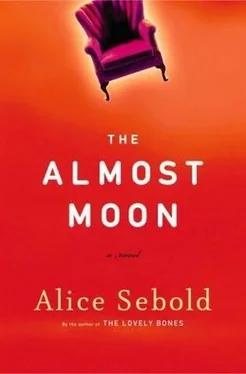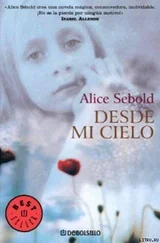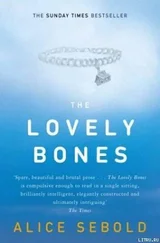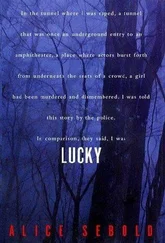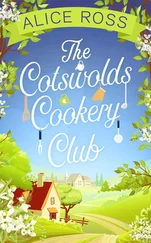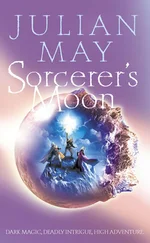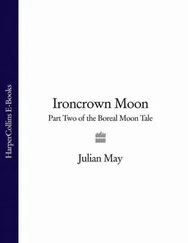“Not yet,” she’d tell me, and hand me the assignments I’d missed. Even her parents preferred not to have me come over to her house anymore.
“I hate this,” I said.
“Remember Anne Frank?” Natalie said once. “Pretend you’re like her, and you can’t go anywhere until you get the all clear.”
“Anne Frank was exterminated!”
“Well, not that part,” Natalie said.
I began to spend my time calculating. I was a junior. I had eighteen months to go until, somehow, I would get out.
I did not tell my mother this. At home, all roads revolved around her more than they had before. My father and I whispered our hellos in those first six months after Billy died, and when the doorbell rang, we scurried like mice into dark corners, hoping whoever it was would go away. A rock came through the front window once, and we hid this fact from my mother, claiming instead that it had been my father reaching back to turn the page of a newspaper and poking his elbow through the glass. “Can you believe that?” he said with his best variety-show voice. “I didn’t know I was that strong!”
“Or that oblivious,” my mother said, weakly playing her part of condemning him, though we all felt the lack of her sharp tongue. Judgment, her savior and guardian, had left her. Her perch at the window of the living room, from which she could watch Mrs. Tolliver marching by or call the next-door neighbor’s child a slut, was cloaked in a heavy wool curtain that we ceased to open.
Shortly after Christmas of that year and three months after the accident, the Murdochs moved. A truck pulled up in the middle of the afternoon, and four men loaded all their possessions in a little less than three hours. Natalie and I were bike riding when we came over the hill and saw Mrs. Murdoch standing in the front yard with the dog, Billy’s dog. She wore a short checked coat and a circle skirt in heavy gray flannel, a pattern from Simplicity that everyone seemed to have made that year. I remember braking a little as I took in the moving van and the boxes, Mr. Murdoch’s back disappearing into the house, and then my eyes met Mrs. Murdoch’s, and it was everything I could do to keep my balance. As it was, my front tire wobbled dangerously as I all but ceased to pedal.
Natalie came up beside me on her green Schwinn ten-speed. “Let’s go,” she said softly.
And we did. I put my feet on the pedals and moved past Mrs. Murdoch. Billy’s dog, a Jack Russell named Max, strained against his leash, and I had to remind myself it was the wheels of the bike he hated, not me.
How can you apologize for the mother you love? The mother you, too, hate. The only thing I could hope was that Mrs. Murdoch would have plenty of people to love her in the future, plenty of people to console her and to listen to the story of how she lost her son. My mother would have only my father. Then she would have me.
The day the neighbors showed up in the yard, my father had told us he was in Erie, Pennsylvania, shaking up vials of poisonous silt and calculating the rate of sedimentary accretion in the local drinking water.
My mother was in the kitchen, and I had just come in through the side door. After Billy died, she stopped asking me where I’d been. I could have been sleeping with the boy she called the “horror,” who lived down the road and had a tattoo in a time when such a thing was equal to the mark of Cain. She needed all her energy to stay upright.
At some point, after the buzzer on the stove had rung and I’d come out of the downstairs bathroom, having washed up, my mother and I both heard the same low sound together.
It was a gathering of men.
I can’t say how I knew to be scared, but I was. I can say that I was immediately relieved my father was away. Far enough away that he would be gone for days still. And I’ve never known if this was exactly why the men chose that day to come.
In sixth grade I had studied a photo of a lynching in the South. It was a small black-and-white photo that had been mimeographed and distributed by our history teacher, who believed history made the most impact when it was illustrated. Parents throughout the district had complained when their children came home with photos of lynchings, or Auschwitz, or the head of an African warlord raised and dripping on a stick. But the teacher had been right, and the fascination I had had looking at those images now gripped me in the pit of my stomach as I stood with my mother while she held a vegetarian casserole in her hands.
The space between the stove and counter was a short one, but that day the noise outside was a lengthening agent she could not have predicted. We heard it, and the heat of the casserole burning through the dishcloth my mother held it with made her drop the Pyrex dish on the floor.
“You go,” she said.
Panic filled her eyes.
“They want you,” I said.
“But I can’t. You know I can’t.”
And I did know.
I knew my mother’s limitations because they formed the marrow of my bones. I realized then, as I had sensed for years but never named, that I was born in order to be her proxy in the world and to bring that world back home-whether that meant bright construction-paper creations from my first years in school or meeting the angry men out in the yard. I would do it all for her. That was our particular unspoken contract, how this child served this parent.
It had been warm out that day, and I’d changed into a pair of cutoffs upon my arrival home from school. My mother despised cutoffs, thought them cheap and unkempt for the same reasons I loved them, the mangy endless fringe that I could pick at with my nails. I had known I could wear them just as I had indulged in polishing my fingernails that spring. My mother was too weak, for the first time in my life, to make her judgment voluble.
As I tiptoed from the kitchen through the back hall and into the living room, I grabbed the quilt that hung over the side of the couch. I don’t know what I thought I was going to do with it, but instinct told me to cover myself as best I could. I remember I wrapped it around my shoulders as if it were a giant beach towel.
One of the men saw me through a window, and the noise in the side yard flared louder. I was barefoot, and my hair, so thin my ears poked through, hung down on either side of my face. I wanted Natalie to be there. As if together we would be an army that could flank and conquer a crowd of men.
I walked through the small living room, and as I put my hand on the doorknob that led to the screened-in porch, I heard my mother risk two words from the kitchen, where she hid. “Stay safe,” she said very quietly. I knew the effort this took was heroic for her. But something had happened in the time I had crossed the room and put on, as I later thought of it, my superhero cape. My mother, in that moment, had ceased to exist for me.
The first person I saw, when I came through the screened-in porch and out the door, calmed me. It was Mr. Forrest. He was with Tosh. He was standing off to the side of the cluster of fathers and husbands, and he made a point, when I glanced at him over the waist-high fence, of trying to smile. But it was a sick and worried attempt. Tosh, usually frenetic under the best of circumstances, was hidden behind Mr. Forrest’s legs.
“Where’s your mother?” one of the men asked. There were six of them, seven if I counted Mr. Forrest.
“She’s inside,” another one answered him, though he was staring at me. “She’s always inside, right?”
This truth, stated so boldly out in the open air, was like a poison arrow coming out of nowhere. I felt a tightness in my chest and paused just long enough to take a breath.
“Can’t you speak?” Mr. Tolliver asked. I hated him, and this hatred was unaided by my mother’s judgments of how he marched his wife around our block. He kept a small piece of wood painted white and in the shape of a gravestone that said, HERE HE LIES, COLD AND HARD, THE LAST DOG WHO SHIT IN MY YARD! The rhyme was supposed to make it funny. I’ve always traced my disdain of what generous people call “lawn art” to the first time I read the words of that mock grave.
Читать дальше
